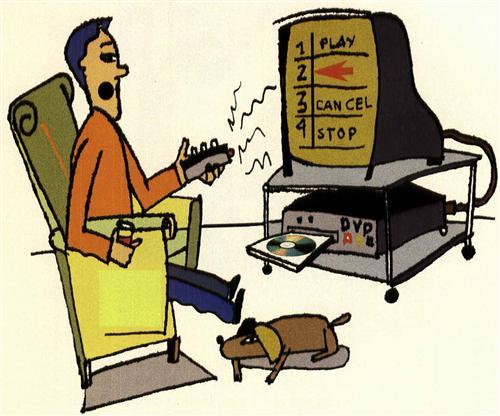
The entire family — even grumpy Uncle George — loves to curl up on the couch with a bowlful of popcorn and watch movies. Next time, you can add your own Hollywood razzle-dazzle to the Saturday-night ritual. Before George pops ET into the DVD player, entertain your kin with flicks about your family history.
These days, anyone can get in on the action: Moviemaking has moved into the mainstream, thanks to DVD burners. These nifty little drives, which are showing up in new computers, allow users to burn movies and slide shows to DVD, then share them with anyone who has a DVD player.
If your computer doesn’t have a DVD recorder, you can pick up an internal unit for as little as $250, or spend about twice as much for an external. Currently, a battle is being waged between two DVD formats: DVD-RW and DVD+RW — reminiscent of the old VHS vs. Beta debate. Unlike the earlier video-format war, however, both DVD formats generally work with newer DVD movie players. And industry analysts believe that in time, compatibility between the two formats will improve. Which format will prevail? Here’s a clue: Microsoft announced that it’s going to build support for DVD+RW into a future operating system.
Of course, if you’re getting ready to buy a new computer system, look for one that has a DVD burner built in. Both Sony and Toshiba recently released new laptops with DVD burners and bundled software that makes home moviemaking a snap.
Even if you don’t dream of becoming the next Steven Spielberg, you may want to buy a burner strictly for DVDs’ massive storage capacity — at 4.7GB, each disc holds seven times as much as a CD. That adds up to preservation possibilities beyond many family historians’ wildest dreams: Imagine high-resolution scanned documents, before-and-after copies of restored photos, digital video of old home movies and genealogy databases and files on dozens of family lines, all kept neatly on a single disc. You could archive your lineage back to the Middle Ages and still have room to spare.
But why stop with storage when jazzing up your genealogy is so easy? Once you have a DVD-recording drive, outfit your computer with DVD-authoring software; then you can edit your memories into movies. Consumer packages priced under $100, such as the ones on the next page, supply all the essential tools for creating a family history video or slide show. Some of the higher-priced authoring software is best left to professional videographers, anyway — it has a learning curve you don’t want to touch (unless your crystal ball shows an Oscar in the future).
I dabbled with several DVD-authoring programs to see what a moviemaking novice like me could produce. And I was surprised at what a professional-looking movie I could create.
Using software such as Roxio Video Wave Movie Creator, I created a family slide show, complete with music, in less than an hour. It was easy to edit my digital video and burn a movie, which I then watched on my DVD player. I could even create a Hollywood-style DVD menu using drag-and-drop technology. Those menus let you view the entire film or watch only certain chapters, just as you can with commercial DVDs. I also could go into the “library” and grab a variety of cool transitions to place between slides or scenes. Adding special effects, such as slow motion, made me feel as if that Oscar might be within my reach!
If you’re unsure how to assemble a movie, don’t worry — several software packages include a feature called storyboarding. A storyboard acts as your timeline: It lets you visualize your movie shot by shot, making it easy to see where to add a transition, how long to play a certain song or where to add your own voice-over.
Each program has its own bells and whistles. For example, Broderbund MovieShop Deluxe (see box) includes music clips in blues, classical, guitar, jazz, Latin, rock and ragtime, as well as sounds such as bells, applause, sirens, boings and swooshes. Sony’s Click-to-DVD, available exclusively on selected VAIO PCs, contains animated backgrounds and music, basic editing and special effects such as fade in/fade out. It will automatically match the length of a slide show to selected music, too.
I worked mainly with footage from my digital video camera, but the process for a slide show works the same way. Just pick out the memories you want to include, and spend an afternoon editing the sequence and adding music, text or voice-over. Then burn copies onto DVDs to send to relatives.
You can create and share all kinds of family history-related DVDs: genealogy vacations, treks to family cemeteries, vintage family photos, anniversaries, family reunions, weddings, graduations — you name it. I thought it would be fun to use a DVD for a “this is your life” type of project. Suppose you want to make a movie about your grandfather. Wouldn’t it be neat to put together a slide show of old photos, military papers and mementos, and intersperse them with video clips of people telling stories about him? If he’s still living, add his own voice-overs to the slides or video. What a legacy to leave for future generations.
So grab those old photos, scan them into your computer, download video and get your family history DVD rolling. Saturday night and that big bowl of popcorn are just a few days away.
Movie makers
• Broderbund MovieShop Deluxe
<www.broderbund.com>: $89.99
• neoDVD
<www.mediostream.com>: standard version $29.99, plus version $49.99
• Pinnacle Expression
<www.pinnaclesys.com>: $49.99
• Roxio VideoWave Movie Creator
<www.roxio.com>: $79.95
• Sonic MyDVD Plus
<www.sonic.com>: $79.99
• Ulead DVD MovieFactory
From the April 2003 issue of Family Tree Magazine.



